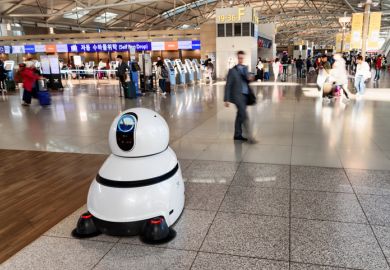I receive many invitations to attend webinars and download explainers about the ethical and responsible use of artificial intelligence in higher education. I’ve a keen interest in the topic and want to take part in the important discussion about how these new technologies should shape our world.
But I’ve become increasingly disillusioned. In addition to being the director of my university’s Teaching and Learning Center, I’m also a tenured philosopher with a specialisation in ethics. What passes for ethical discussion in these spaces strikes me as unimaginative, at best.
My colleagues seem to think that only a few considerations are relevant to questions about what we should do with AI tools, and they frame the conversation in such a way that a limited range of conclusions are on the table. They’re working with an unduly narrow conception of ethics.
To be clear, I’m not upset because I think this work should be left to the ethicists. I do, however, think the evident lack of imagination amounts to an abdication of higher education’s responsibility – to ourselves, our students and society at large.
Let’s start with the narrow range of what’s considered relevant. There are a number of reasons to be concerned with generative AI. Among them is that it is incredibly energy-intensive and threatens to increase harmful emissions. The press often frames this issue in terms of the question whether high energy demands now will bring about reductions later on due to increases in efficiency. Meanwhile, those who’ve historically received the short end of the stick are bearing the costs in terms of damage to their local environments. At least the fourth estate is considering the matter; universities are largely skirting it.
Take, for example, the generative AI webpages of the University of Michigan and the University of Texas, two excellent universities and among the best places in the world to study ethics. Both give scant mention of ethics in relation to generative AI, and neither mentions environmental impact. The Cornell University site at least includes environmental impact among relevant ethical considerations, but it quickly moves on to focus on privacy, accuracy and equity. And though the European Commission puts “environmental well-being” among the headings of its questions for educators, the actual questions underneath make no mention of energy consumption.
You might think this makes sense because these universities are focused on educating students, not saving the planet. You’d be wrong. Both UM and UT declare climate change among humanity’s greatest challenges and tout programmes to tackle it. Yet, when it comes to generative AI, they’re mainly concerned with academic honesty and data security. (No matter that these tools were trained on large datasets of other people’s words and images, with significant outstanding legal questions.)
It's not that privacy, security and bias don’t matter. It’s that they’re not all that matters.
This brings me to my second complaint. The typical webinar or explainer promises to help me learn “how to” use AI. This framing is inviting, promising concrete techniques I can put into practice. It’s also restrictive, limiting discussion of reasons not to use AI to the domain of the technical. If it won’t undermine student learning objectives or violate university policy, go for it!
Ethics is the study of what should be done. This includes questions about consistency with policy and law, as well as questions about well-being and morality. It also includes possible conclusions, not just about how to do something, but also about whether to do it.
Let me head off one obvious rejoinder. It won’t do to say that generative AI is here to stay, so we may as well learn how to use it. That people already do something or that the possibility of doing it will never go away aren’t reasons to assume we should be doing it.
An analogy may help. Even supposing it will always be possible to eat meat and that many people will continue to do so, it would be strange if every discussion of the ethics of eating meat were framed in terms of how to eat it responsibly. There’s room to ask how to more ethically raise animals to be eaten and to ask whether it’s ethical to eat them in the first place. What’s different about AI?
This gets at the crux of the matter. When those of us tasked with producing and disseminating knowledge acquiesce to the narrative that it’s ethical and responsible to use AI tools as long as they don’t undermine the narrow policies and objectives of institutions of higher learning, we abandon our responsibility to lead society in pursuit of the truth.
But you might object: Simply asking questions is futile and won’t change anything. To which I say: If you think enquiry is ineffectual, then you shouldn’t be working in higher education. By failing to ask the hard questions ourselves, we’re failing to model for our students how to do so. And what is it we’re doing with our lives if we think teaching and learning make no real impact?
It’s important we remember that there’s room for nuance. Some uses of AI may be worthwhile, even with emissions and other costs taken into account. I’m not calling for every university to ban AI. I’m calling for us to engage in good faith ethical enquiry. This is the responsible way to chart a path forward.
Benjamin Mitchell-Yellin is an associate professor of philosophy at Sam Houston State University, Texas.
Register to continue
Why register?
- Registration is free and only takes a moment
- Once registered, you can read 3 articles a month
- Sign up for our newsletter
Subscribe
Or subscribe for unlimited access to:
- Unlimited access to news, views, insights & reviews
- Digital editions
- Digital access to THE’s university and college rankings analysis
Already registered or a current subscriber?








